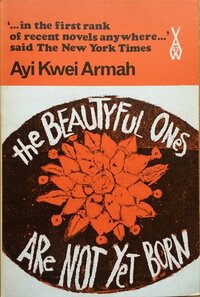Take a photo of a barcode or cover
I've spent a good deal of my life carefully fine tuning my reading in an effort to pierce the veil of my hyperlocalized US WASP life and get the sort of enrichment required that, should it all come crashing down, I'll see it as the rebirth the world so sorely needed and not get sucked into the doomsday paradigm of the many who consider themselves above all that. The problem, of course, is when one is veering away from the 'popular' structure, the 'professional' structure often proves the status quo's backup plan, and so my delving into the 1001 and co. and parsing out anyone not white for especial perusal made for a rather half-assed lesson plan, where every step forward had a 25-75% chance of being two steps backward. This particular book showcases a very thought-heavy viewpoint of Ghana in the aftermath of the supposed decolonized/socialist revolution, which in many ways works against the stereotypes and other literary dehumanizations that the mainstream continues to evoke of "African" writing in the 21st century. However, I've gone some way into growing out of the need to hash out the academic merits whilst composing my personal opinion, so while this text is extremely valuable in the bigger picture of literature as a whole, it's also deceptively myopic, ideologically heavy handed, and lays on the metaphors of excrement thickly enough to desensitize most readers whose experience would otherwise benefit from such pathos. Then again, considering its reception in the white world, perhaps that's exactly what the typical white reader needs. I suppose I should be pleased to no longer be at that stage that needs Plato's Cave copy pasted out every so often (as happens in this work) to relearn what should never be forgotten.
reflective
slow-paced
Really good ending, had lots of proverbs and a unique message, but the first 100 pages felt unreadable at times.
challenging
informative
reflective
slow-paced
Plot or Character Driven:
Character
Strong character development:
Complicated
Loveable characters:
No
Diverse cast of characters:
N/A
Flaws of characters a main focus:
Complicated
emotional
reflective
slow-paced
Plot or Character Driven:
Character
Strong character development:
Complicated
Loveable characters:
Complicated
Diverse cast of characters:
Yes
Flaws of characters a main focus:
Yes
Почело је добро - троми, досадни живот неименованог чиновника на железници, који покушава да се уклопи у ново друштво, обликовано након стицања независности Гане и његово згражавање над корупцијом са којом и сам долази у додир.
Након тог сјајног почетка долази потпуно уметнути део, као есеј (у виду разговора) о колонијализму у коме аутор жели да нам објасни зашто је колонијализам лош и све мане постколонијалног друштва. Овај део ми је био потпуно безвезе и без икакве повезаности са причом.
После тога, књига се завршава описом вечере нашег наратора и његовог пријатеља од раније који се у новом друштву много боље "снашао" тако што је ушао у политику и практично преузео обрасце понашања бивших колонијалних господара. И ту се, наравно, потцртавају све мане и негативне стране.
Да је било мање очигледног поповања од стране самог аутора, могло је ово бити изузетно. Овако је само занимљиво више са фолклорног становишта.
Након тог сјајног почетка долази потпуно уметнути део, као есеј (у виду разговора) о колонијализму у коме аутор жели да нам објасни зашто је колонијализам лош и све мане постколонијалног друштва. Овај део ми је био потпуно безвезе и без икакве повезаности са причом.
После тога, књига се завршава описом вечере нашег наратора и његовог пријатеља од раније који се у новом друштву много боље "снашао" тако што је ушао у политику и практично преузео обрасце понашања бивших колонијалних господара. И ту се, наравно, потцртавају све мане и негативне стране.
Да је било мање очигледног поповања од стране самог аутора, могло је ово бити изузетно. Овако је само занимљиво више са фолклорног становишта.
3.5 stars — Really enjoyed this book and the use of the grotesque by Armah. Underneath the filth (the literal shit) I found opportunity for change and it was just a question of how long a person is supposed to wait for change to come (and why wait for someone else). A lot of thoughts. I find it interesting that Achebe saw Armah as squandering his talents when he has so vividly depicted Ghana at a moment in time where the nation’s leaders sought to find an identity in African socialism, often at the expense of the everyday man. I’d be interested to know if Armah was anti socialist and what he thought would remedy “postcolonial” Ghana. To me, Ghana is unrecognizable (something Achebe also critiques) because it was trying to become a nation while grappling with colonial legacies—trying to assert their place in the world as a new nation.
* “So it should be easy to take the rot of the promise. It should be easy now to see there have never been people to save anybody but themselves, never in the past, never now, and there will never be any saviours if each will not save himself”
* “So it should be easy to take the rot of the promise. It should be easy now to see there have never been people to save anybody but themselves, never in the past, never now, and there will never be any saviours if each will not save himself”
Okay, so I was supposed to have finished this over a week ago for class, but the font is just so damn small in my copy (final answer). I do not think I have ever read a novel as hopeless and disgusting as this one.
Who up thinking about toilet rebirth? Just me? Okay.
Who up thinking about toilet rebirth? Just me? Okay.
dark
reflective
slow-paced
Plot or Character Driven:
Character
Strong character development:
Complicated
Loveable characters:
Yes
Diverse cast of characters:
No
Flaws of characters a main focus:
Yes
It curiously resonates much with my background and upbringing on another continent in another era.




